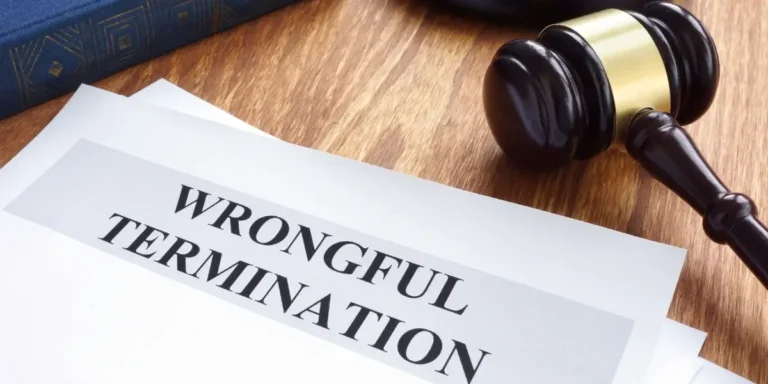When you’re let go from your job, you might find yourself questioning whether the termination was justified. Was your firing fair? Did your employer have a valid reason for letting you go? Understanding the concepts of wrongful termination and at-will employment can help you determine if your termination was legally appropriate or if you have grounds for a wrongful termination claim.
In this blog post, we’ll explore the differences between wrongful termination and at-will employment, how they impact your rights as an employee, and what to do if you believe you’ve been wrongfully terminated.
What is At-Will Employment?
In most states, the default type of employment is at-will employment. At-will employment means that an employer can terminate an employee at any time, for any reason, and without prior notice—as long as the reason is not illegal. On the flip side, it also means that an employee can leave their job at any time, for any reason, without giving notice to the employer. This arrangement is the most common employment relationship in the United States.
At-will employment gives employers considerable flexibility. It allows them to manage their workforce without needing to provide an explanation or justification for firing someone. It also allows businesses to adjust quickly to changing circumstances, such as financial issues or workforce restructuring. However, at-will employment is not without its limits.
What is Wrongful Termination?
While at-will employment provides employers with broad discretion in firing employees, there are key exceptions that prevent employers from firing employees for illegal reasons. Wrongful termination occurs when an employer violates the law, an employment contract, or public policy by terminating an employee.
Examples of wrongful termination include:
Discrimination: Firing someone based on their race, gender, age, religion, national origin, or disability. These actions are illegal under federal and state anti-discrimination laws.
Retaliation: Firing an employee for engaging in protected activities such as reporting illegal activities (whistleblowing), filing a workers’ compensation claim, or participating in an investigation into workplace discrimination or harassment.
Breach of Employment Contract: If you have a written contract that specifies the conditions under which you can be terminated, your employer may be violating the contract if they terminate you without following the agreed-upon conditions.
Violation of Public Policy: Employees cannot be fired for actions that are protected by law, such as taking leave for medical reasons under the Family and Medical Leave Act (FMLA) or serving on a jury.
Constructive Discharge: In some cases, an employer may create a hostile or intolerable work environment that forces an employee to resign. In these cases, an employee may have a claim for wrongful termination even though they technically quit.
The Key Differences Between Wrongful Termination and At-Will Employment
While at-will employment gives employers the ability to terminate employees for almost any reason, wrongful termination refers to a situation where an employer fires an employee for illegal reasons or in violation of specific legal protections.
Here are some important differences between the two concepts:
Legal Protections:
At-Will Employment: While at-will employment gives an employer the right to terminate an employee at any time, it is not an absolute right. The termination cannot be based on illegal reasons, such as discrimination, retaliation, or breach of an employment contract. Employers must still comply with laws that protect employees from unlawful firings.
Wrongful Termination: Wrongful termination occurs when the termination violates federal, state, or local laws. If an employer fires you for a reason that violates anti-discrimination laws, retaliation protections, or public policy, this is considered wrongful termination.
Reasons for Termination:
At-Will Employment: In an at-will employment situation, an employer can fire an employee for almost any reason, such as poor performance, economic necessity, or even no reason at all—as long as the reason is not illegal. This makes it easy for employers to terminate employees without offering justification.
Wrongful Termination: If an employee is fired for an illegal reason—such as being discriminated against or retaliated against for filing a complaint—this constitutes wrongful termination. Wrongful termination can also occur if an employer violates an employment contract or breaches public policy.
Employee Rights:
At-Will Employment: While at-will employment grants employers the freedom to terminate employees without cause, employees still have some protections under the law. Employees are protected from terminations that violate federal or state laws (such as discrimination or retaliation laws). Additionally, employees may be protected by the terms of an employment contract or union agreement.
Wrongful Termination: Employees who are wrongfully terminated have the right to challenge their termination and seek legal recourse. They may file a lawsuit or claim with the Equal Employment Opportunity Commission (EEOC), or pursue other legal remedies such as reinstatement or compensation for damages.
Documentation and Proof:
At-Will Employment: In an at-will employment situation, employees generally do not need to provide a reason for quitting or an employer doesn’t need to justify the termination (unless required by contract or law). There may be no documentation needed to end the employment relationship, except for certain circumstances.
Wrongful Termination: Employees who believe they’ve been wrongfully terminated may need to provide evidence to support their claims. This can include documentation such as emails, performance reviews, complaints of discrimination or harassment, and witness testimony. Employees seeking legal recourse may need to prove that their termination violated laws or contracts.
When Can You Challenge an At-Will Termination?
While at-will employment gives employers broad authority to terminate employees, there are situations where you can challenge a firing. You can take action if:
Your termination violates specific laws (e.g., anti-discrimination laws or retaliation laws).
You were fired in violation of an employment contract or union agreement.
Your termination was based on public policy violations (e.g., firing for taking medical leave, reporting unsafe working conditions, or serving on a jury).
What to Do If You Believe You’ve Been Wrongfully Terminated?
If you suspect that your termination was wrongful, the first step is to document everything. This includes:
Keeping track of any communications related to your firing, such as emails or memos.
Writing down details about your job performance and any complaints or discrimination you might have experienced.
Retaining any contracts or agreements that might provide legal protections.
Next, consult with an employment attorney. An experienced attorney can help you understand whether your firing was truly wrongful, assess your legal options, and guide you through the process of pursuing a claim.
Conclusion
Understanding the difference between wrongful termination and at-will employment is crucial if you find yourself facing termination. While at-will employment generally allows an employer to terminate you without cause, certain legal protections ensure that you cannot be fired for illegal reasons. If you believe your termination violated any laws or contractual agreements, you may have grounds for a wrongful termination claim.
By knowing your rights and seeking legal advice, you can better navigate the complex world of employment law and protect yourself if you’ve been wrongfully terminated. If you believe your firing was unfair or illegal, it’s important to take action and ensure that your rights are upheld. We recommend wrongful termination lawyers maryland.












